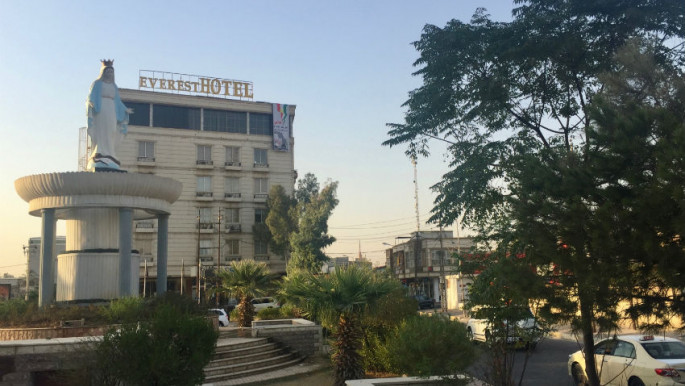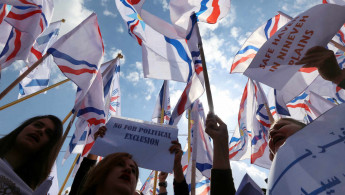Erbil's Christians decry 'discriminatory and exploitative' Kurdish business regulation
The numerous Christian symbols, Christian-owned businesses and churches in the neighbourhood are testament to the relative security Christians enjoy in Iraqi Kurdistan.
However, community leaders here allege a long history of discrimination against Christians by the Kurdistan Regional Government (KRG). The latest point of contention is a ruling that allegedly forces Ainkawa business owners to pay to renew their commercial licenses, while other predominantly Kurdish neighbourhoods don't face the same regulation.
"They see Ainkawa as a place they can exploit easily," Dr Daniel Rawand Pols, a member of the local Chaldean Catholic Church, told The New Arab. "Most Kurds are organised in tribes. They have weapons and are not afraid of the government. The only place [the KRG] can blackmail is Ainkawa."
The regulation is an attempt to exploit Christians economically, says Pols and others here, while Kurdish authorities strenuously deny the policy singles out Ainkawa.
'Discriminatory and targeted'
The discrimination claims first caught Western attention when the Assyrian Policy Institute, a US-based organisation that seeks to educate the public on Iraq's Assyrian community, published a report on the regulation on June 26.
The KRG issued an order on January 23, 2018, requiring businesses in Ainkawa to renew their licenses with the director of Erbil Centre District for a fee, whereas previously they had renewed them free of charge at the local mayor's office in Ainkawa, according to the report entitled KRG Imposes Discriminatory New Regulation on Assyrians in Ankawa.
Locals only became aware of the policy in June - and the rule does not apply to the other nine sections of the Erbil Centre District, the report said.
 |
| A statue of Mary looks over the predominantly Assyrian Christian Ainkawa suburb of Erbil, Iraq [Adam Lucente] |
Pols said the new arrangement of going to Erbil Centre District purposefully squeezes time and money out of Ainkawa business owners.
"It prolongs procedures, and now people are asked to pay bribes and go to five or six different committees," Pols alleges.
The Assyrian Policy Institute's director said the community thinks the rule is part of a push to marginalise Assyrians in the Kurdistan Region.
"They feel it's part of a wider, longstanding strategy to create pressure on Assyrians under the Kurdistan Regional Government," Reine Hanna told The New Arab.
Other examples of this pressure include the seizing of Assyrian land to build Erbil International Airport, and unusually high taxation in Ainkawa, according to Hanna.
Read more: The Assyrians' challenge in a post-IS Syria
"These practices are discriminatory and targeted," she said.
Assyrian social media accounts posted about the regulation following its publishing, with some calling it a form of jizya - a tax on non-Muslims in Islamist societies.
'Based on misinformation'
The KRG says the policy does not target Christians. In a press release following the Assyrian Policy Institute's report, the KRG said the allegations were "baseless" and false.
"It is completely a fabrication and based on misinformation," the government said. "KRG has one income tax policy for the entire Kurdistan Region."
The policy, known as executive order 1688, issued by the Kurdish prime minister-led Council of Ministers, is a rule to ensure businesses throughout the districts around Erbil meet public health and safety standards, according to the release. The order applies to all districts under the mayorship of Erbil, which includes Ainkawa and neighbouring areas, the government said.
 |
| An election official sits under an Assyrian-language sign at a school in Erbil [Adam Lucente] |
The KRG also dismissed the idea that it was persecuting Christians.
"The KRG is very proud of the ethnic, cultural and religious diversity in the Kurdistan Region," it said.
The Assyrian Policy Institute published another report in response, which said the rebuttal was part of a pattern of the regional government denying mistreatment of Assyrians.
Hanna said the community was upset with the dismissive KRG response, which referenced the Assyrian Policy Institute report directly, but also that Assyrians were surprised Erbil had at least officially noted their grievances.
"We've never gotten a response [before]," said Hanna. "I'm shocked the KRG responded."
There is disagreement in Ainkawa on how the KRG treats its Christian constituents, and some Ainkawa Christians agree with the KRG.
Ano Abdoka is an official in the ruling Kurdistan Democratic Party (KDP) in Ainkawa and a member of the Assyrian community. He categorically disputes that the Kurdish government is unfairly targeting his community.
In an article titled "Ankawa or Erbil there are no differences", he echoed arguments that the law applied equally to other areas, and said he was reassured it did not unfairly target Assyrians after speaking to KRG officials.
Abdoka's views on the KRG stem from his feelings of safety in Erbil.
"Erbil and Ainkawa from the past until today have been adjacent to peace and harmony," he told The New Arab.
 |
|
|
Assyrian voters in Ainkawa on September 25, 2017, the day
of the Kurdistan Independence Referendum [Adam Lucente] |
Abdoka's disagreement with the Assyrian Policy Institute highlights the division in northern Iraq's Christian community on Kurdistan's policies.
In 2017, Assyrians protested against the removal of the mayor of the Assyrian Alqosh village by KRG officials, and the community has also demonstrated against Kurdish encroachment on Assyrian land.
Meanwhile, many Christians voted for Kurdistan's secession from Iraq during the Kurdistan independence referendum in September 2017, and some Christian paramilitary groups fought alongside the Kurdish Peshmerga against the Islamic State group in Nineveh province, home to many ancient Assyrian villages.
One reason for Christian support of the Kurdistan region is the relative security they enjoy here as compared with the rest of Iraq. Tens of thousands of Christians fled to Ainkawa from Mosul and the Nineveh province following the rise of IS in 2014.
'A soft way to kick us out'
The tensions between Christians and Kurds in the region date back decades, and arguably have their roots in the time of the Armenian Genocide. Some Kurdish communities assisted Ottoman authorities in killing Armenians, who share the same Christian faith as Assyrians.
The assassination of Assyrian leader Shimun XXI Benjamin, who was Catholicos Patriarch of the Assyrian Church of the East, in 1918, by Kurdish fighter Simko Shihak is still commemorated by Assyrians today. Benjamin's death occurred at the same time as the Armenian Genocide, as did killings of Assyrians by Ottoman forces. These events are known here as the Assyrian Genocide.
Assyrians have historically faced persecution from Iraqi authorities as well, such as during the 1933 Simele Massacre of Assyrians by Iraqi soldiers.
Today, the regulatory, land and political grievances those in Ainkawa have with the Kurdistan Region demonstrate only the newest attempts to drive Assyrians from their ancestral homes, according to Pols.
"It seems like a soft way to kick us out without making an international fuss about it," he said. "They've taken from us successfully until now."
Adam Lucente is a freelance journalist. He has worked in Iraq, Jordan, Tunisia and across the region. Follow him on Twitter @Adam_Lucente



